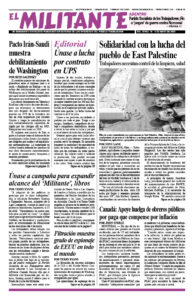MANCHESTER, England — Nurses, members of the Royal College of Nursing union, who before last December had never gone on strike in their 106-year history, voted April 14 to reject the government’s most recent pay offer, against their national officers’ advice. The nurses union called a 48-hour strike for April 30.
U.K. Prime Minister Rishi Sunak had hoped to get this dispute settled quickly, to put an end to the wave of public sector strikes.
Workers rejected a 5% pay increase this year, plus a one-time lump-sum payout for most workers. Lump-sum payments like this are now being offered by bosses to lure workers to accept deals without further raising their long-term wages. Inflation, hitting an annual 13.5% in March despite government claims it would fall, continues to eat at workers’ living standards.
Some nurses, ambulance-service workers and other National Health Service (NHS) workers who are members of the Unison union voted 3-1 to accept the offer.
The government has ruled out improving its pay offer to nurses and said no further talks will be held.
“The government is refusing to listen, to give us the respect and the time, and to even recognize that without staff there is no NHS,” Harry Eccles, a nurse from the south of England who voted against the government’s offer, told the BBC.
Other workers are also fighting against the grinding effects of inflation and deteriorating working conditions. Teachers in the National Education Union voted by 98% to reject the most recent pay offer of a 5% increase for 2022 plus 4.5% for 2023, along with a lump sum. The four teachers unions announced another round of strike days April 27 and May 2.
Rail worker members of the Rail, Maritime and Transport Workers union who work for 14 different privately owned train-operating companies, known as TOCs, are voting on a proposal to continue strike action in pursuit of a decent wage raise and against brutal attacks on their conditions and jobs.
These workers have now received an offer of a 5% raise retroactive to 2022 with no conditions and 4% for this year, contingent on all workers, except station workers, being saddled with a two-tier wage system.
The rail bosses have for now set aside the demand to impose driver-only trains and the closing of all ticket offices in 2023, although these continue to be their goal. Instead, their latest offer is tied to the attack on station workers, who are the less well-organized.
Neither the government nor the rail bosses had expected the determination of rail workers to fight, nor the support they have gained.
At the same time, Rail, Maritime and Transport union members at the state-run Network Rail voted by 76% to accept an improved offer in March. They had been part of the union’s actions for 16 days along with the TOC workers. The deal includes a larger cash lump sum in back pay, plus a 5% pay increase for last year and 4% for this year, backdated to October.
Discussion among workers on all these issues continues. “We started with being offered virtually nothing and have gained,” Nick White, a union representative at Network Rail’s operation at Manchester Piccadilly station, said. “I’ll still be going to the TOC strike picket. We stood together for months.”
“It’s the first time I’ve been on strike. We’d got as far as we could. It was worth it,” rail worker Alex Burke said. “I don’t know how money they said didn’t exist appeared by magic after the strikes.”
Cleaners who are employed by various rail contractors went on strike April 14 and 15, demanding 15 pounds ($18.80) an hour, company sick pay and other conditions company-employed rail workers have won.

